英文单词复数变化
- 格式:doc
- 大小:245.50 KB
- 文档页数:77
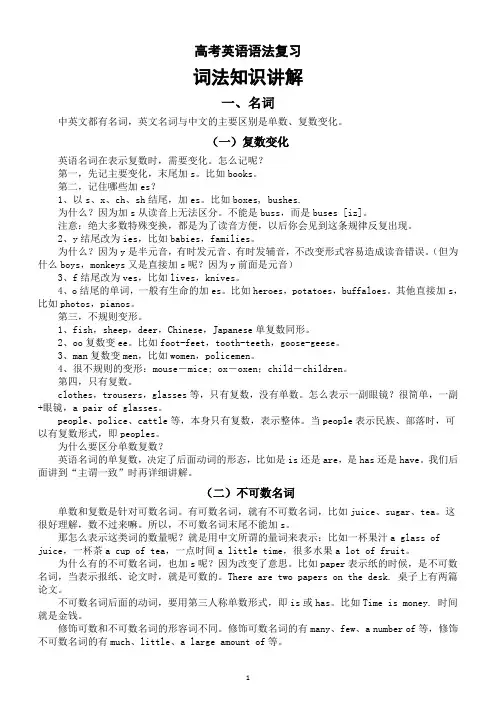
高考英语语法复习词法知识讲解一、名词中英文都有名词,英文名词与中文的主要区别是单数、复数变化。
(一)复数变化英语名词在表示复数时,需要变化。
怎么记呢?第一,先记主要变化,末尾加s。
比如books。
第二,记住哪些加es?1、以s、x、ch、sh结尾,加es。
比如boxes, bushes.为什么?因为加s从读音上无法区分。
不能是buss,而是buses [iz]。
注意:绝大多数特殊变换,都是为了读音方便,以后你会见到这条规律反复出现。
2、y结尾改为ies,比如babies,families。
为什么?因为y是半元音,有时发元音、有时发辅音,不改变形式容易造成读音错误。
(但为什么boys,monkeys又是直接加s呢?因为y前面是元音)3、f结尾改为ves,比如lives,knives。
4、o结尾的单词,一般有生命的加es。
比如heroes,potatoes,buffaloes。
其他直接加s,比如photos,pianos。
第三,不规则变形。
1、fish,sheep,deer,Chinese,Japanese单复数同形。
2、oo复数变ee。
比如foot-feet,tooth-teeth,goose-geese。
3、man复数变men,比如women,policemen。
4、很不规则的变形:mouse-mice; ox-oxen;child-children。
第四,只有复数。
clothes,trousers,glasses等,只有复数,没有单数。
怎么表示一副眼镜?很简单,一副+眼镜,a pair of glasses。
people、police、cattle等,本身只有复数,表示整体。
当people表示民族、部落时,可以有复数形式,即peoples。
为什么要区分单数复数?英语名词的单复数,决定了后面动词的形态,比如是is还是are,是has还是have。
我们后面讲到“主谓一致”时再详细讲解。
(二)不可数名词单数和复数是针对可数名词。
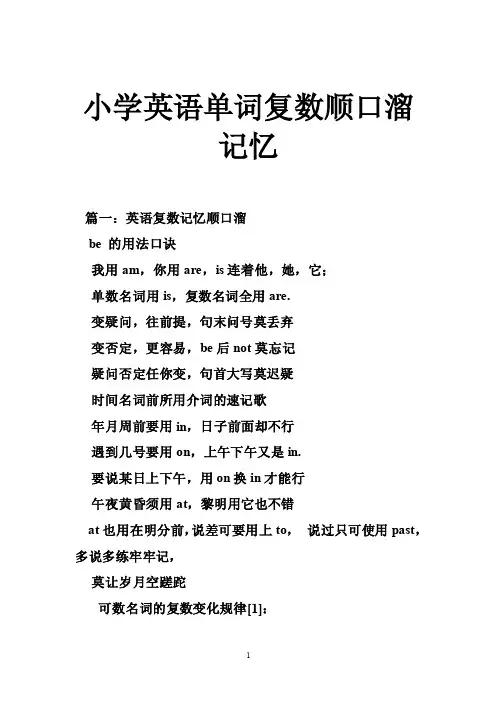
小学英语单词复数顺口溜记忆篇一:英语复数记忆顺口溜be 的用法口诀我用am,你用are,is连着他,她,它;单数名词用is,复数名词全用are.变疑问,往前提,句末问号莫丢弃变否定,更容易,be后not莫忘记疑问否定任你变,句首大写莫迟疑时间名词前所用介词的速记歌年月周前要用in,日子前面却不行遇到几号要用on,上午下午又是in.要说某日上下午,用on换in才能行午夜黄昏须用at,黎明用它也不错at也用在明分前,说差可要用上to,说过只可使用past,多说多练牢牢记,莫让岁月空蹉跎可数名词的复数变化规律[1]:名词复数有规律,一般词尾加s;辅音字母+y型,变y为i,es;ch,sh真有趣,s,x,es;f(转载于: 小龙文档网:小学英语单词复数顺口溜记忆),fe真小气,字母v来把它替,es在后别忘记;字母o来真神奇,有生命来es,没有生命+s.可数名词复数特殊变化规律[2]:中日好友来聚会,绵羊、鹿、鱼把家回。
男士、女士a变e;牙(齿)、脚双o变双e;孩子们想去天安门,原形后面r、e 、n;老鼠本来爱大米,mice,ice和rice.注:中Chinese,日Japanese,好友people.绵羊sheep,鹿deer,鱼fish (这些单词单复数一样)一般现在时态(一)I、we、you、they作主语,动词原形后面跟;否定句,更容易,动词前面加don't;疑问句,别着急,句首Do,来帮你,后面问号别忘记;肯定回答用Y es,I、we、you、they加上do;否定回答要用No,I、we、you、they加don't. (二)主语三单他、她、它,动三形式后面压,词尾一般s加;辅音字母+y型,变y为i,es;ch,sh真有趣,s,x,es;三个特殊那里去?has、goes和does;否定句,记住它,动词前面doesn't;疑问句,别着急,句首Does,来帮你;肯定回答用Y es,he、she、it加does;否定回答要用No,he、she、it、doesn't;Does、doesn't来帮你,后面动词定注意,恢复原形要切记。
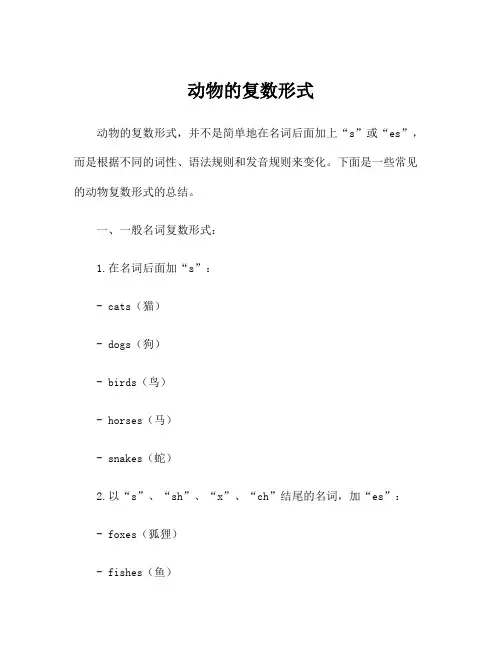
动物的复数形式动物的复数形式,并不是简单地在名词后面加上“s”或“es”,而是根据不同的词性、语法规则和发音规则来变化。
下面是一些常见的动物复数形式的总结。
一、一般名词复数形式:1.在名词后面加“s”:- cats(猫)- dogs(狗)- birds(鸟)- horses(马)- snakes(蛇)2.以“s”、“sh”、“x”、“ch”结尾的名词,加“es”:- foxes(狐狸)- fishes(鱼)- bushes(灌木)- churches(教堂)3.以辅音字母+y结尾的名词,变y为i,再加“es”:- flies(苍蝇)- puppies(小狗)- ponies(小马)- fairies(仙女)4.一些名词有不规则的复数形式:- mice(老鼠)- geese(鹅)- children(孩子)- women(女人)- men(男人)5.以“o”结尾的名词,有时加“es”,有时直接加“s”:- tomatoes(西红柿)- kangaroos(袋鼠)- zoos(动物园)- mosquitoes(蚊子)二、专有名词复数形式:1.以“s”结尾的专有名词,不变:- The Simpsons(辛普森一家)- The Joneses(琼斯一家)2.以“y”结尾的专有名词,变y为i,再加“es”:- The Kennedys(肯尼迪家族)- The Murphys(墨菲家族)三、不可数名词:一些名词属于不可数名词,没有复数形式,如:- water(水)- milk(牛奶)- coffee(咖啡)- sugar(糖)有一些名词在复数形式上有特殊意义,可能形象地描述某一类动物的一群,如:- a pack of wolves(一群狼)- a herd of elephants(一群大象)- a swarm of bees(一群蜜蜂)总结动物的复数形式并不仅仅是列举单词。
在实际应用中,我们要根据具体的情境和词性、语法规则来确定具体的复数形式。
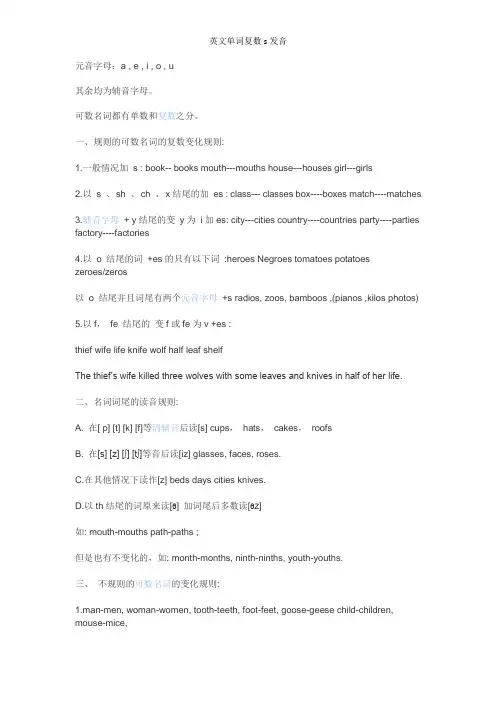
元音字母:a , e , i , o , u其余均为辅音字母。
可数名词都有单数和复数之分。
一、规则的可数名词的复数变化规则:1.一般情况加s : book-- books mouth---mouths house---houses girl---girls2.以s 、sh 、ch 、x结尾的加es : class--- classes box----boxes match----matches3.辅音字母+ y结尾的变y为i加es: city---cities country----countries party----parties factory----factories4.以o 结尾的词+es的只有以下词:heroes Negroes tomatoes potatoeszeroes/zeros以o 结尾并且词尾有两个元音字母+s radios, zoos, bamboos ,(pianos ,kilos photos)5.以f,fe 结尾的变f或fe为v +es :thief wife life knife wolf half leaf shelfThe thief’s wife killed three wolves with some leaves and knives in half of her life.二、名词词尾的读音规则:A. 在[ p] [t] [k] [f]等清辅音后读[s] cups,hats,cakes,roofsB. 在[s] [z] [∫] [t∫]等音后读[iz] glasses, faces, roses.C.在其他情况下读作[z] beds days cities knives.D.以th结尾的词原来读[θ] 加词尾后多数读[θZ]如: mouth-mouths path-paths ;但是也有不变化的,如: month-months, ninth-ninths, youth-youths.三、不规则的可数名词的变化规则:1.man-men, woman-women, tooth-teeth, foot-feet, goose-geese child-children, mouse-mice,2.单复数相同: sheep, deer, Chinese, Japanese Swiss.3.以man, woman 修饰名词构成合成词时,两个词都变化.man servant-men servants. (boy/girl students名词变复数的发音规则以元音音素结尾的加了“s”后发/z/音如:windows \ doors\ computers \centers以清辅音结尾的加了“S"后发/s/音如:chicks \ maps\ cups以字母t结尾的发/ts/音如:mats \ cats\ aunts以字母d结尾的发/dz/音如:birds \ words\ hands其他辅音音素结尾的都发/z/音。
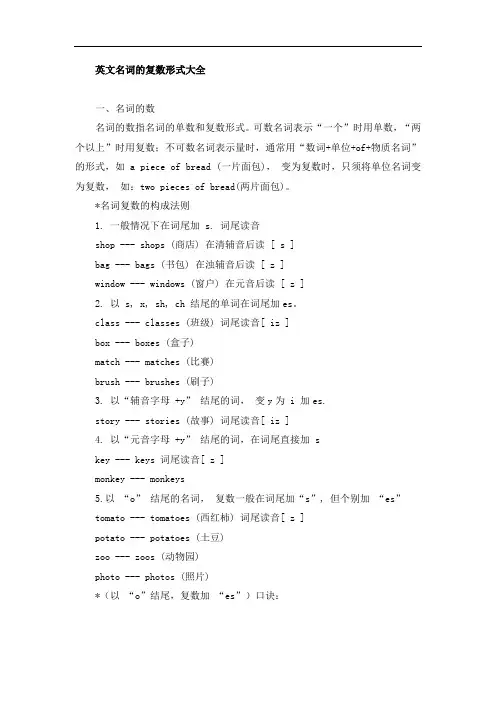
英文名词的复数形式大全一、名词的数名词的数指名词的单数和复数形式。
可数名词表示“一个”时用单数,“两个以上”时用复数;不可数名词表示量时,通常用“数词+单位+of+物质名词”的形式,如 a piece of bread (一片面包),变为复数时,只须将单位名词变为复数,如:two pieces of bread(两片面包)。
*名词复数的构成法则1. 一般情况下在词尾加 s. 词尾读音shop --- shops (商店) 在清辅音后读 [ s ]bag --- bags (书包) 在浊辅音后读 [ z ]window --- windows (窗户) 在元音后读 [ z ]2. 以 s, x, sh, ch 结尾的单词在词尾加es。
class --- classes (班级) 词尾读音[ iz ]box --- boxes (盒子)match --- matches (比赛)brush --- brushes (刷子)3. 以“辅音字母+y” 结尾的词,变y为 i 加es.story --- stories (故事) 词尾读音[ iz ]4. 以“元音字母 +y” 结尾的词,在词尾直接加 skey --- keys 词尾读音[ z ]monkey --- monkeys5.以“o” 结尾的名词,复数一般在词尾加“s”, 但个别加“es”tomato --- tomatoes (西红柿) 词尾读音[ z ]potato --- potatoes (土豆)zoo --- zoos (动物园)photo --- photos (照片)*(以“o”结尾,复数加“es”)口诀:黑人(Negro)英雄(hero),左手拿着西红柿(tomato),右手拿着破土豆(potato),头顶一个大芒果(mango)。
6. 以 f或 fe 结尾的词,多数变f或 fe 为 ves.leaf --- leaves (树叶) 词尾读音[ vz ]knife --- knives ( 小刀)*(以f或fe结尾的单词,需把f或fe 变ves的单词)口诀:妻子(wife)持刀(knife)去宰狼(wolf),小偷(thief)吓得发了慌,躲在架下(shelf)保己命,半(half)片树叶(leaf)遮目光。
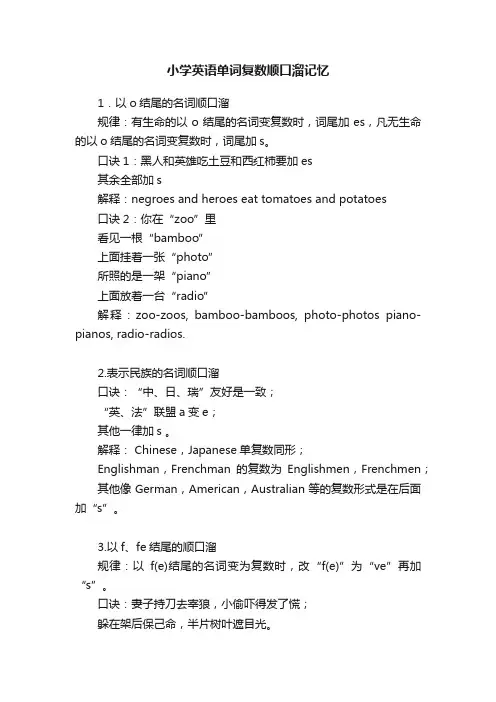
小学英语单词复数顺口溜记忆1.以o结尾的名词顺口溜规律:有生命的以o结尾的名词变复数时,词尾加es,凡无生命的以o结尾的名词变复数时,词尾加s。
口诀1:黑人和英雄吃土豆和西红柿要加es其余全部加s解释:negroes and heroes eat tomatoes and potatoes口诀2:你在“zoo”里看见一根“bamboo”上面挂着一张“photo”所照的是一架“piano”上面放着一台“radio”解释:zoo-zoos, bamboo-bamboos, photo-photos piano-pianos, radio-radios.2.表示民族的名词顺口溜口诀:“中、日、瑞”友好是一致;“英、法”联盟a变e;其他一律加s 。
解释: Chinese,Japanese单复数同形;Englishman,Frenchman的复数为Englishmen,Frenchmen;其他像German,American,Australian等的复数形式是在后面加“s”。
3.以f、fe结尾的顺口溜规律:以f(e)结尾的名词变为复数时,改“f(e)”为“ve”再加“s”。
口诀:妻子持刀去宰狼,小偷吓得发了慌;躲在架后保己命,半片树叶遮目光。
解释: wife(妻子), knife(刀子),wolf(狼)thief(小偷),shelf(架子),life(生命)leaf(树叶),self(自己), half(一半)4.巧记不规则名词单变复口诀:大鹅老鼠齐步走男男女女龇龇牙解释:goose-geese; mouse-mice; foot-feet;man-men; woman-women; tooth-teeth;5.单复数形式一致的顺口溜口诀:一个中国人和一个日本人骑着一只羊和鹿去吃水煮鱼。
解释:Chinese, Japanese , deer, sheep, fish。
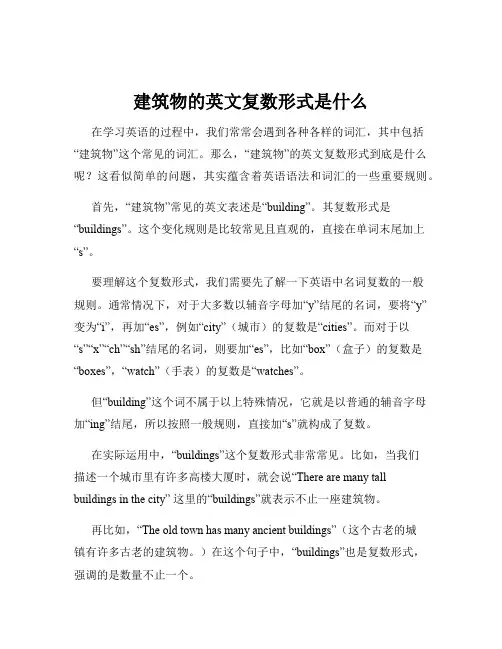
建筑物的英文复数形式是什么在学习英语的过程中,我们常常会遇到各种各样的词汇,其中包括“建筑物”这个常见的词汇。
那么,“建筑物”的英文复数形式到底是什么呢?这看似简单的问题,其实蕴含着英语语法和词汇的一些重要规则。
首先,“建筑物”常见的英文表述是“building”。
其复数形式是“buildings”。
这个变化规则是比较常见且直观的,直接在单词末尾加上“s”。
要理解这个复数形式,我们需要先了解一下英语中名词复数的一般规则。
通常情况下,对于大多数以辅音字母加“y”结尾的名词,要将“y”变为“i”,再加“es”,例如“city”(城市)的复数是“cities”。
而对于以“s”“x”“ch”“sh”结尾的名词,则要加“es”,比如“box”(盒子)的复数是“boxes”,“watch”(手表)的复数是“watches”。
但“building”这个词不属于以上特殊情况,它就是以普通的辅音字母加“ing”结尾,所以按照一般规则,直接加“s”就构成了复数。
在实际运用中,“buildings”这个复数形式非常常见。
比如,当我们描述一个城市里有许多高楼大厦时,就会说“There are many tall buildings in the city” 这里的“buildings”就表示不止一座建筑物。
再比如,“The old town has many ancient buildings”(这个古老的城镇有许多古老的建筑物。
)在这个句子中,“buildings”也是复数形式,强调的是数量不止一个。
了解“building”的复数形式“buildings”不仅对于我们正确的英语表达很重要,也有助于我们更好地理解和阅读英语文章。
当我们看到“buildings”这个词时,能够迅速反应出它所表示的是多个建筑物的意思,从而准确理解句子和文章的含义。
而且,掌握好名词的复数形式对于英语的写作也非常关键。
如果在写作中使用错误的名词复数形式,可能会让读者对我们的语言水平产生误解,甚至影响文章的整体质量。
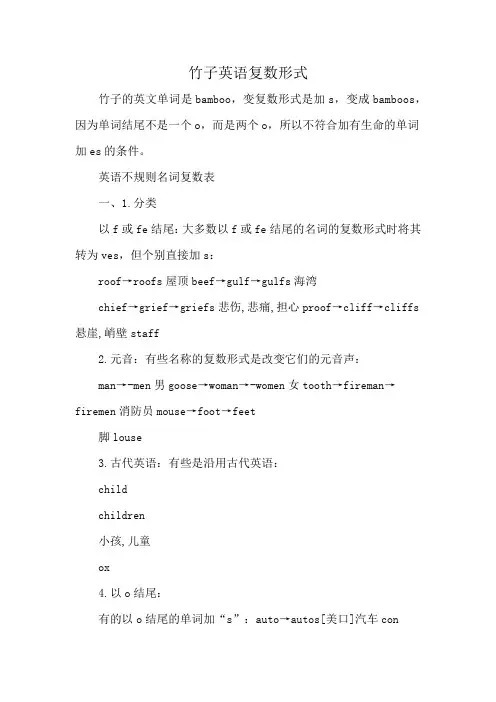
竹子英语复数形式竹子的英文单词是bamboo,变复数形式是加s,变成bamboos,因为单词结尾不是一个o,而是两个o,所以不符合加有生命的单词加es的条件。
英语不规则名词复数表一、1.分类以f或fe结尾:大多数以f或fe结尾的名词的复数形式时将其转为ves,但个别直接加s:roof→roofs屋顶beef→gulf→gulfs海湾chief→grief→griefs悲伤,悲痛,担心proof→cliff→cliffs 悬崖,峭壁staff2.元音:有些名称的复数形式是改变它们的元音声:man→-men男goose→woman→-women女tooth→fireman→firemen消防员mouse→foot→feet脚louse3.古代英语:有些是沿用古代英语:childchildren小孩,儿童ox4.以o结尾:有的以o结尾的单词加“s”:auto→autos[美口]汽车con→kangaroo→kangaroos袋鼠solo→kilo→kilos千克,公斤soprano→memo→memos[口]备忘录studio→photo→photos照片tattoo→piano→pianos钢琴video→pimento →pimentos多香果zoo→pro→pros赞成意见bamboo→有的则加“es”:echo→echoes回声,反响tomato→embargo→embargoes禁运,禁运令torpedo→hero→heroes英雄veto→potato→potatoes土豆negro→有的两种都可以:buffalo→buffalos/buffaloes/buffalo水牛no→cargo→cargos/cargoes(船/飞机的)货物tornado→halo→halos/haloes光环volcano→mosquito→mosquitos/mosquitoes蚊子zero→motto→mottos/mottoes箴言,格言commando5.不变:有的则不变:cod→cod鳕鱼sheep→deer→deer鹿trout→fish→fish鱼,鱼类bison→offspring→offspring子孙,后裔,幼崽moose →perch→perch鲈鱼aircraft→下面这些都是固有复数,即使单数也是像复数形式:barracks→barracks兵营dice→crossroads→crossroads十字路口gallowsbeefs牛肉chiefs首长,首领proofs证明staffs全体职员geese 鹅teeth牙齿mice老鼠lice虱子oxen牛,阉牛cons反对意见solos,soli独唱,独奏sopranos女高音studios 工作室tattoos文身videos视频zoos动物园bamboos竹子tomatoes 番茄torpedoes鱼雷,水雷vetoes否决,否决权negroes黑人nos/noes没有tornados/tornadoes龙卷风volcanos/volcanoes火山zeros/zeroes零commands/commandoes突击员sheep绵羊trou鲑鱼bison野牛moose驼鹿aircraft飞机,飞行器dice骰子gallows。
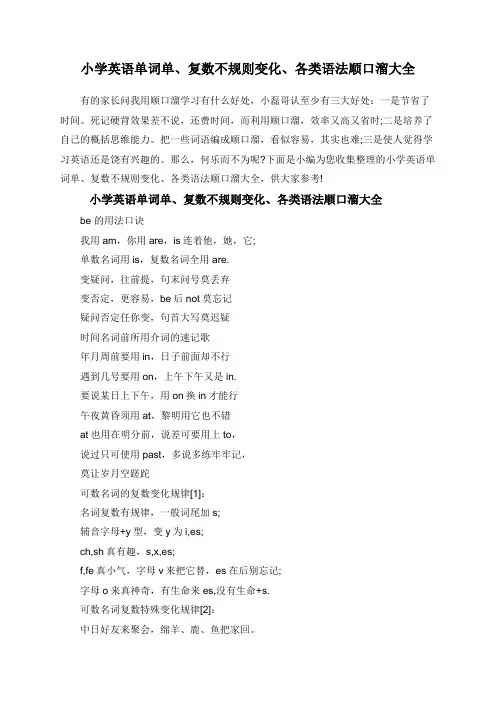
小学英语单词单、复数不规则变化、各类语法顺口溜大全有的家长问我用顺口溜学习有什么好处,小磊哥认至少有三大好处:一是节省了时间。
死记硬背效果差不说,还费时间,而利用顺口溜,效率又高又省时;二是培养了自己的概括思维能力。
把一些词语编成顺口溜,看似容易,其实也难;三是使人觉得学习英语还是饶有兴趣的。
那么,何乐而不为呢?下面是小编为您收集整理的小学英语单词单、复数不规则变化、各类语法顺口溜大全,供大家参考!小学英语单词单、复数不规则变化、各类语法顺口溜大全be 的用法口诀我用am,你用are,is连着他,她,它;单数名词用is,复数名词全用are.变疑问,往前提,句末问号莫丢弃变否定,更容易,be后not莫忘记疑问否定任你变,句首大写莫迟疑时间名词前所用介词的速记歌年月周前要用in,日子前面却不行遇到几号要用on,上午下午又是in.要说某日上下午,用on换in才能行午夜黄昏须用at,黎明用它也不错at也用在明分前,说差可要用上to,说过只可使用past,多说多练牢牢记,莫让岁月空蹉跎可数名词的复数变化规律[1]:名词复数有规律,一般词尾加s;辅音字母+y型,变y为i,es;ch,sh真有趣,s,x,es;f,fe真小气,字母v来把它替,es在后别忘记;字母o来真神奇,有生命来es,没有生命+s.可数名词复数特殊变化规律[2]:中日好友来聚会,绵羊、鹿、鱼把家回。
男士、女士a变e;牙(齿)、脚双o变双e;孩子们想去天安门,原形后面r、 e 、n;老鼠本来爱大米,mice,ice和rice.注:中Chinese,日Japanese,好友people.绵羊sheep,鹿deer,鱼fish (这些单词单复数一样)man--men woman--women tooth--teeth foot--feetchild--children mouse--mice一般现在时态I、we、you、they作主语,动词原形后面跟;否定句,更容易,动词前面加don't;疑问句,别着急,句首Do,来帮你,后面问号别忘记;肯定回答用Yes,I、we、you、they加上do;否定回答要用No,I、we、you、they加don't.主语三单他、她、它,动三形式后面压,词尾一般s加;辅音字母+y型,变y为i,es;ch,sh真有趣,s,x,es;三个特殊那里去?has、goes和does;否定句,记住它,动词前面doesn't;疑问句,别着急,句首Does,来帮你;肯定回答用Yes,he、she、it加does;否定回答要用No,he、she、it、doesn't;does、doesn't来帮你,后面动词定注意,恢复原形要切记。
★清华大学★英语系测试:为中小学生英语量身定做. 官方网站:http://qinghua.yeryy.com/ 清华大学英语教授50年研究成果
名词复数的规则变化
1) 以y结尾的专有名词,或元音字母+y 结尾的名词变复数时,直接加s变复数: 如: two Marys the Henrys monkey —— monkeys holiday —— holidays 比较: 层楼:storey —— storeys story —— stories
2) 以辅音字母+y结尾的词,变y 为i ,再加es ; 如: baby —— babies
3) 以o 结尾的名词,变复数时: a. 加s ; 如: photo —— photos piano —— pianos radio —— radios zoo —— zoos b. 加es ;如:potato —— potatoes tomato —— tomatoes
c. 均可 ; 如:zero —— zeros / zeroes 4) 以f或fe 结尾的名词变复数时: a. 加s ;如: belief —— beliefs roof —— roofs safe —— safes gulf —— gulfs
b. 去f / fe 加ves ;如:half —— halves knife —— knives leaf —— leaves wolf —— wolves wife —— wives life —— lives thief —— thieves
c. 均可 ;如: handkerchief —— handkerchiefs / handkerchieves
5) 以s,sh,ch,x,z 等结尾的词,加es ; 如:bus —— buses watch —— watches 6) 以ce,se,ze,(d)ge等结尾的词,加s ; 如: license —— licenses
名词复数的不规则变化 1)child —— children foot —— feet tooth —— teeth mouse —— mice man —— men woman —— women 注意:与 man 和 woman构成的合成词,其复数形式也是 -men 和 -women。 如: an Englishman,two Englishmen. 但German不是合成词,所以复数形式为 Germans ;Bowman是姓,其复数是the Bowmans。 2)单复同形 如: deer,sheep,fish,Chinese,Japanese li,jin,yuan,two li,three mu,four jin 但除人民币元、角、分外,美元、英镑、法郎等都有复数形式。如: a dollar,two dollars ; a meter, two meters
3)集体名词,以单数形式出现,但实为复数。 如: people ;police ;cattle 等本身就是复数,不能说 a people,a police,a cattle, 但可以说a person ;a policeman ;a head of cattle ;the English ;the British ;the French,the Chinese,the Japanese,the Swiss 等名词,表示国民总称时,作复数用。 如: The Chinese are industries and brave. 中国人民是勤劳勇敢的。
4)以s结尾,仍为单数的名词,如: maths,politics,physics等学科名词,为不可数名词,是单数。 news 是不可数名词。 the United States ;the United Nations 应视为单数。 如:The United Nations was organized in 1945. 联合国是1945年组建起 来的。 以复数形式出现的书名,剧名,报纸,杂志名,也可视为单数。 如:"The Arabian Nights" is a very interesting story-book. <>是一本非常有趣的故事书。
5) 表示由两部分构成的东西,如:glasses (眼镜) ,trousers ,clothes 若表达具体数目,要借助数量词 pair(对,双) ;suit(套) ;a pair of glasses ;two pairs of trousers
6) 另外还有一些名词,其复数形式有时可表示特别意思,如:goods货物,waters水域,fishes(各种)鱼
★清华大学★英语系测试:为中小学生英语量身定做. 官方网站:http://qinghua.yeryy.com/ 清华大学英语教授研究组提供 牛津小学英语单词表 a, an 一(个,件)(an 用于元音音素开头的词前) (3A1) a carton of 一(纸)盒 (4B9) a cup of 一(茶)杯 (4B7) a glass of 一(玻璃)杯 (4A9) a lot (of) 许多,大量 (5A1) a pair of 一双(条,副…) (4A6) aah (因惊奇或出乎意料而)发出“啊”的喊叫 (5A3) about 大约;关于 (4B3) absent 缺席 (5B2) accordion 手风琴 (3B10) address 地址 (6B7) Africa 非洲 (6B6) after 在…以后;在…后面 (5A7) after school 放学后 (5A7) afternoon 下午,午后 (4A7) again 又,再 (4A8) ago 以前 (6A3) ah [表示惊恐、愉快、遗憾等] 啊;呀 (4A2) airport 机场 (4B6) Aladdin 阿拉丁(6A2) album (用以粘贴照片、邮票等的) 粘贴簿 (3B3) all 所有的;全部 (5A1, 8) all right 好;行;不错 (3A4, 4A1) along 沿着 (6B3) also 也,还 (6A6) always 总是 (6A1) America 美国 (5B9) American 美国人;美国的;美国人的 (5B 9) and 然后;加;和;[用于句首] 还 (3A1; 4A 7, 8, 6) animal 动物 (5A4) answer 回答,答复 (3B6; 6A7) ant 蚂蚁 (5B8) any 任何的;一些 (5A1) anything 什么事(物);任何事(物) (4B7) Anything else? 还要别的东西吗? (4B7) apple 苹果 (3A3; 4B4) April 四月 (6A2) arm 手臂 (5B6) art 艺术;美术 (5A9) as 作为,当做 (6A2) as … as 和…一样 (6B1) ask 问 (6A1) at 在 (4A7) at home 在家 (5A6) at once 立刻, 马上 (5B1) at school 在学校;在上课 (5A1) at the back of 在…后部;在…后面 (6A7) August 八月 (6A2) aunt 伯母;舅母;婶;姑;姨 (3B3; 5B3) Australia 澳大利亚 (5B9) Australian 澳大利亚人 (5B9) autumn 秋季 (6A5) away (离)开 (6A1) back 回(原处) (5A1) backache 背痛 (5B2) bad 坏的;严重的 (3A5) bag 包;袋 (3B1) ball 球 (4B6) ball game 球类运动 (3B10) ball pen 圆珠笔 (3A5) balloon 气球 (4A4) banana 香蕉 (3A3; 4B4) bar 块;条 (3B8) baseball 棒球运动;棒球 (3B10) basket 篮;筐 (3A9) basketball 篮球运动;篮球 (3B10) bathroom 浴室,盥洗室 (3B7;) be 是;成为;变成 (4A8) am (3A11) are (3A5; 4A1) aren’t = are not (4B3) is (3A2;4A1) isn’t = is not (4A2) be good at 善于 (6B2) be late for 迟到 (4B2) beach 海滩 (6A6) bear 熊 (4A2) beautiful 美丽的,漂亮的 (5B3) beautifully 美地 (5B4) because 因为 (4B1; 6B5) bed 床 (3A4; 3B7) bedroom 卧室,寝室 (3B7) bee 蜜蜂 (5B 8) before 在…以前 (3B5) begin 开始 (5B7) behind 在…后面 (5A2) Beijing Opera 京剧 (6B6) belt 皮带 (3B9) beside 在…旁边;靠近 (6A7) better 好些 (5B2) big 大的 (3A11; 4A6) bike 自行车 (3A8; 3B5) bird 鸟 (3A1; 6A1) birthday 生日 (6A2) biscuit 饼干 (4B7) black 黑色的 (3A2) blackboard 黑板 (4B8) blanket 毛毯,毯子 (5A8) blouse (女式)衬衫 (3A7)